Homemade vanilla
Welcome to my happy place of DIY, homemade, homegrown, handmade, nourished & crafted, whole hearted living. Finding magic in the mundane & growing some roots in the process.
3 Quick & Easy Methods for Preserving Fresh Eggs
November 3, 2022
This post may contain affiliate links. If you click on a link and purchase an item, I will receive a small commission. For more info, please see my disclosure on my Connect page.
I guess you could say our backyard has become some sort of chicken orphanage or sanctuary. Hensctuary? Chickphanage? I don’t know, but it makes me smile. These last couple of years, our coop has slowly been filling up with refugee birds that have lost their homes and have nowhere else to go. We’ve got chickens of all kinds and lovely fresh eggs of every color. Battling health problems, I’ve needed all the happiness I can get, and, for some reason, keeping chickens brings me joy.
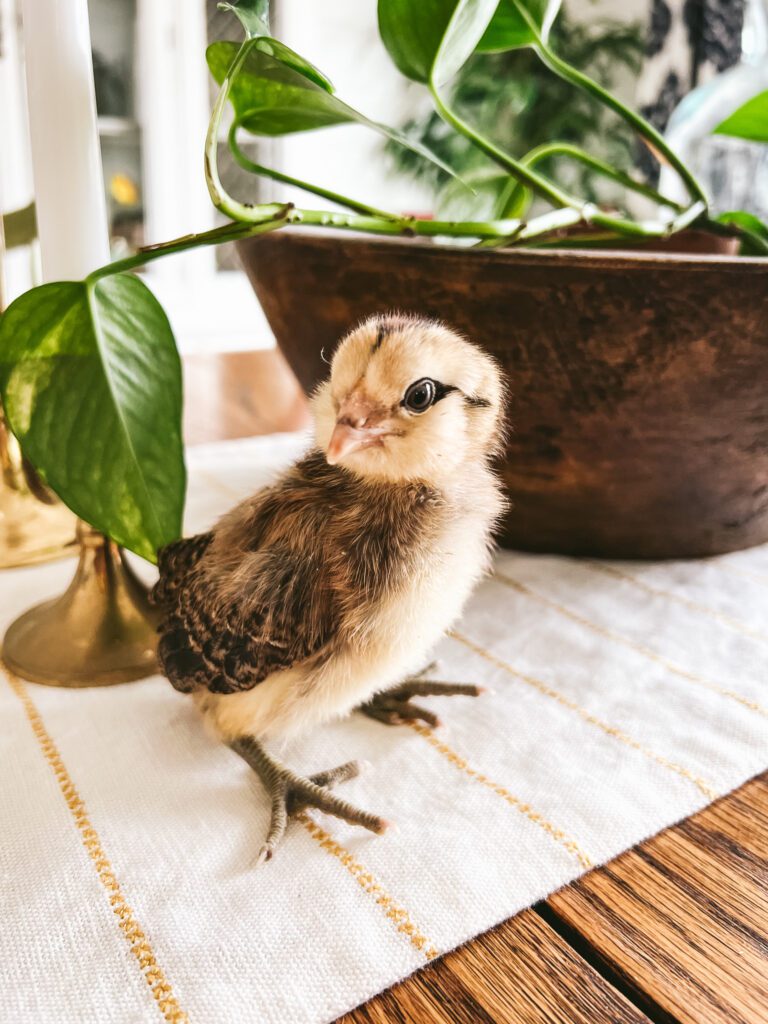
With the adopted birds + the chicks we raised back in the spring, our chicken coop has been overflowing with eggs and, even though I can’t currently eat them due to diet restrictions, I sure have loved it!
In all my years of backyard chickens, having too many eggs has been never been an issue until this year. I mean, don’t get me wrong, I’m not complaining! It’s a good kind of problem to have! Over the last 6 months, I’ve gifted and sold dozens upon dozens to friends, neighbors, and family. With skyrocketing feed costs, and only charging $3 a dozen, I definitely didn’t make any money off selling the excess eggs, which is a bummer. But live and learn, right?
Next year, I’ll have to do more market research, be brave, and adjust prices.
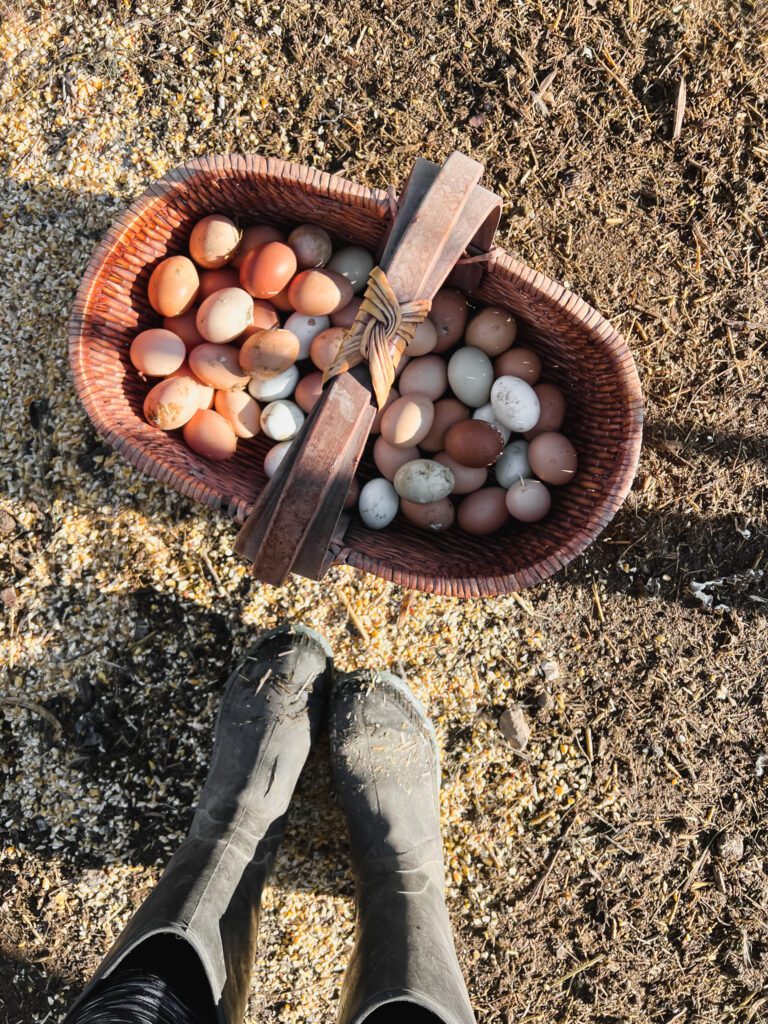
The snow is falling, the days are getting shorter, and the daylight is fading fast. Because I don’t light or heat my coop, egg production is dropping off quickly. Knowing that eggs will soon be hard to come by, I spent some time learning how to preserve some of my excess egg bounties.
I found 3 egg preservation methods and gave them each a shot. This summer was a trial period so I don’t know yet how well I like each method, but I thought I’d share what I’ve been doing.
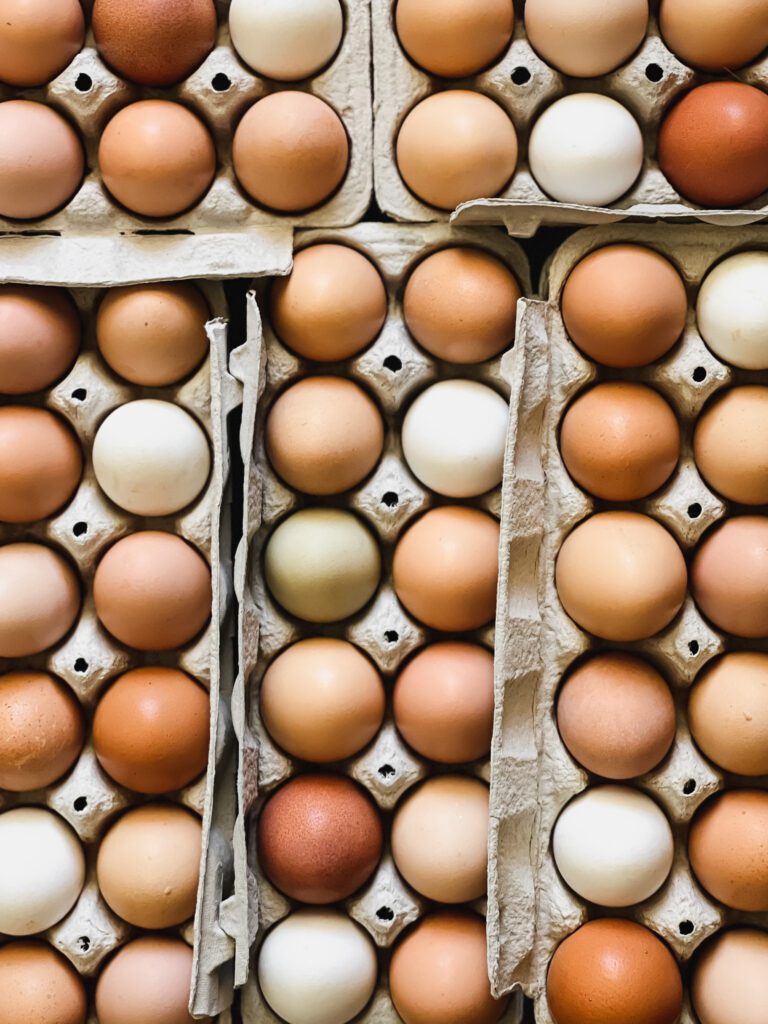
These ideas aren’t anything new, people have been using them for generations.
I’ve just never had an egg plethora, so I’ve never had a reason to try until now! I am listing the blog posts that I read & youtube videos I watched while learning and prepping because they were super helpful. Please stop by their websites sites for more in-depth details!
Freezing Eggs in Bulk
Earlier in the summer, I found a big clutch of eggs in the corner of the coop. I gave them the old float test to check for freshness and froze the good ones.
After reading THIS post from Cami of Tidbits, I mixed up a batch to freeze. With a 6’7″ husband and 3 growing teenagers still in the house, we go through a lot of food. Not as much as when my sweet boy was at home, but still! If I’m scrambling eggs, I usually use about 18 so that’s what I put in each bag. The great thing about this method is you can customize it completely to your needs. If your household only requires 6 eggs, freeze that amount. Need a dozen, do that.
It’s not an exact science or set recipe, it’s just eggs in a bag in the freezer so don’t overthink it.
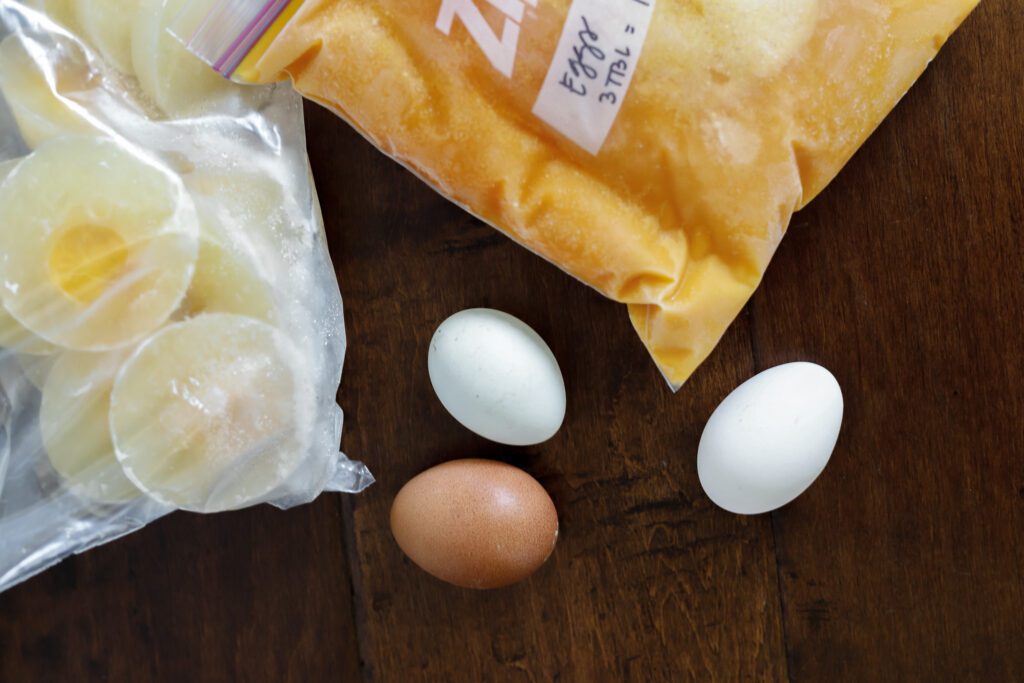
How to freeze eggs in bulk:
- Crack desired amount of eggs into a bowl or blender
- Add a bit of salt, if desired
- Whisk or blend
- Pour into freezer bags or containers
- Label & freeze
When it’s time to use, thaw the bag of eggs overnight in the fridge or if you can’t wait, try thawing under cold water to speed up the process. Just know that everything I read on multiple posts said NOT to thaw in the microwave, so heads up on that.
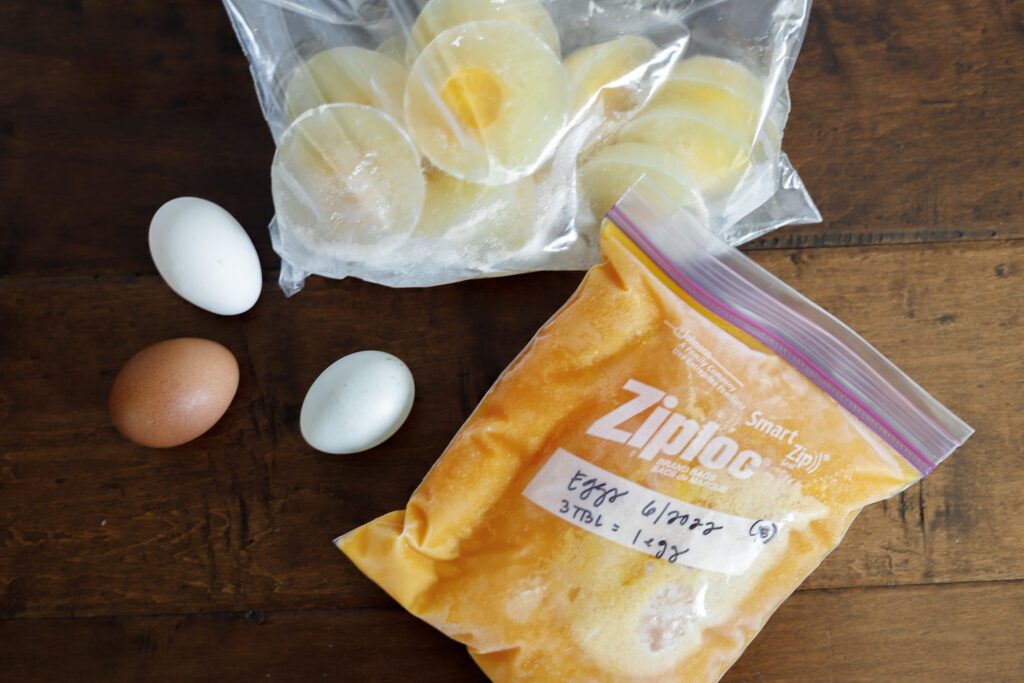
1 egg = 1/4 cup (which is also equal to 4 Tablespoons or 2 oz.)
If you want to thaw a bag but aren’t going to get through the whole thing all at once, don’t stress. Use what you need and refrigerate the rest for later.
Freezing Eggs Individually
For the times I need a couple of eggs and don’t want to thaw a whole batch, I froze some individually. I used THIS helpful post from Leah at Fabulous Farm Girl as a resource.
This method was super simple! I just cracked an egg into each of the cups of a silicon muffin tin and stuck the whole thing in the freezer overnight. Once frozen, I popped out the eggs and put them in a labeled freezer bag. Gotta tell you, we have a big deep chest freezer and it was a bit nerve-wracking to put an open muffin pan of eggs in there! With kids getting in and out all day for popsicles, I had to cross my fingers that when I checked back, there wouldn’t be eggs frozen all over everything.
Thankfully, it worked out great.
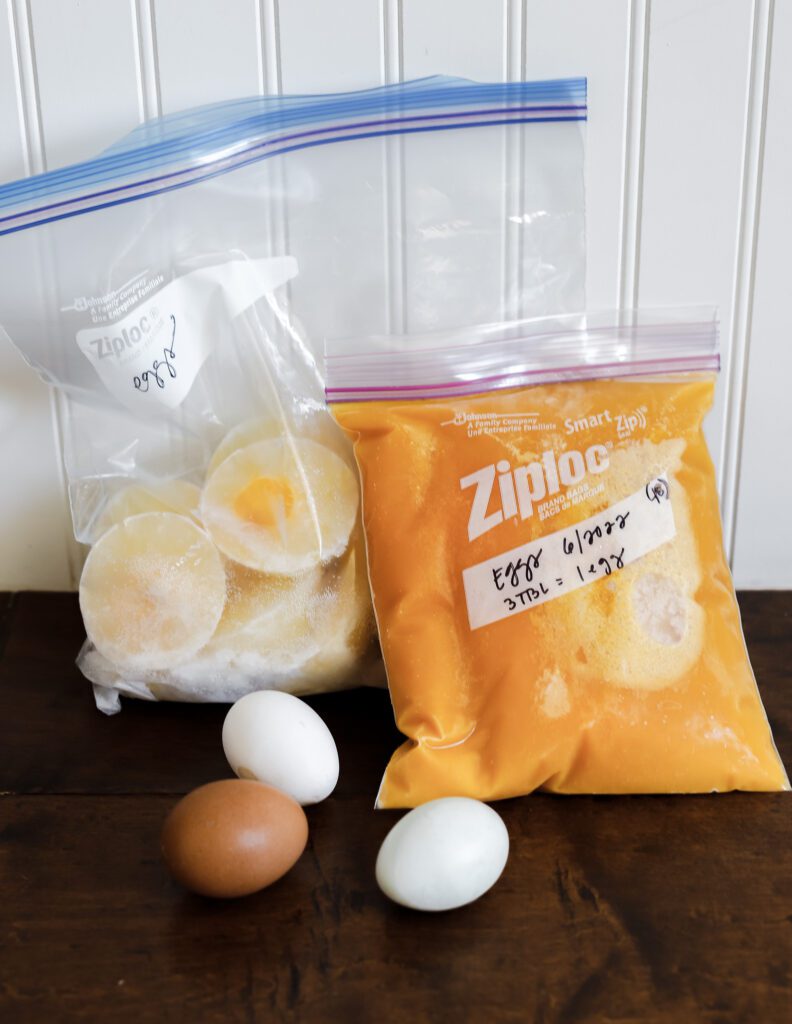
I did see that some posts suggested whipping up the egg instead of cracking it straight into the muffin cup. Supposedly this makes it easier to work with after thawing because you don’t have to reincorporate the egg. I went with the lazy route this time, but I’ll try it on my next attempt.
This individual egg method also allows for frying eggs. Just know that you won’t be able to fry a sunny-side-up egg due to changes in the yolk. My two youngest kids prefer “flat” eggs, so I’m not stressing too much over it.
Waterglassing Fresh Eggs
The last technique I tried is called water glassing.
Water glassing is an old-timey method using a pickling lime and water solution to store eggs long-term. This cannot be done with washed or store-bought eggs, only fresh, just-laid eggs with the bloom intact. So keep that in mind. I had several friends tell me to try water glassing, but I’ll admit I have been a little skeptical. I had a day where the ladies went crazy laying so I figured why not, and gave it a shot.
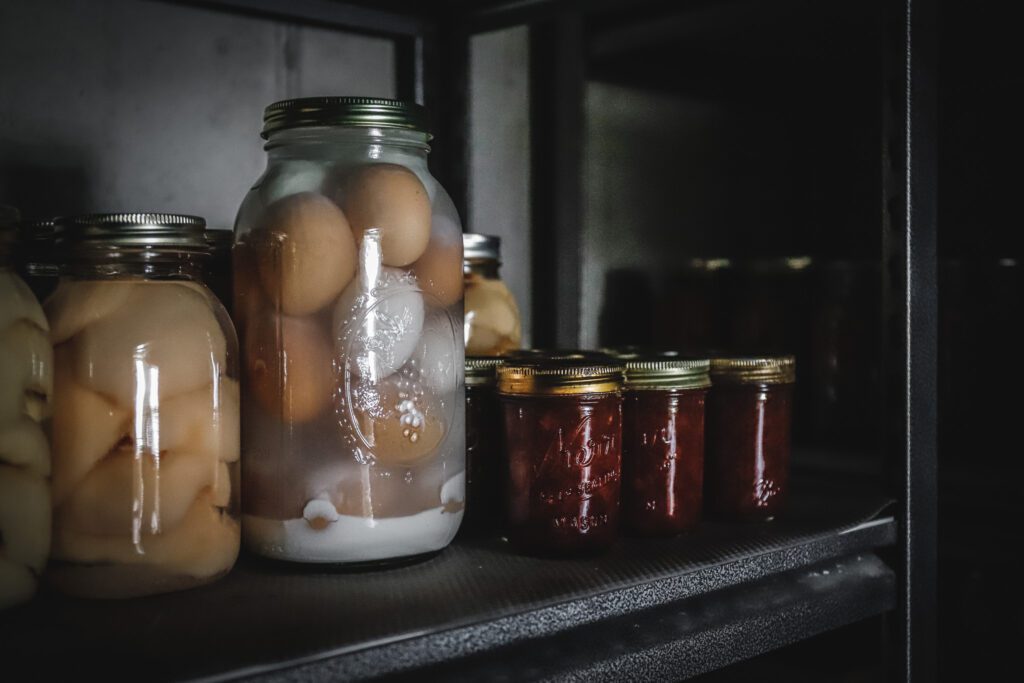
Before starting, I read a bunch because I was pretty nervous. I found THIS post from Farmhouse on Boone and THIS youtube video by Homesteading Family very helpful. Many people buy construction lime in bulk bags, but I decided to go with a small bag of pickling lime from the canning section at my hardware store to ease my mind and try it out on a smaller scale. I don’t want to be storing a big bag of lime if I find out I don’t love this method.
Here’s what you’ll need:
- Pickling lime
- Water
- A half-gallon jar or small bucket with a tight-fitting lid
- Fresh eggs that have not been washed but are clean
Fill the jar with eggs. I think I got 17 inside my half-gallon mason jar. Mix together 1 oz pickling lime to 1 quart of water then pour over the eggs, making sure they are completely submerged. Put the lid on and you’re done. Store in a cool, dry place for winter. The eggs will keep for 12-18 months.
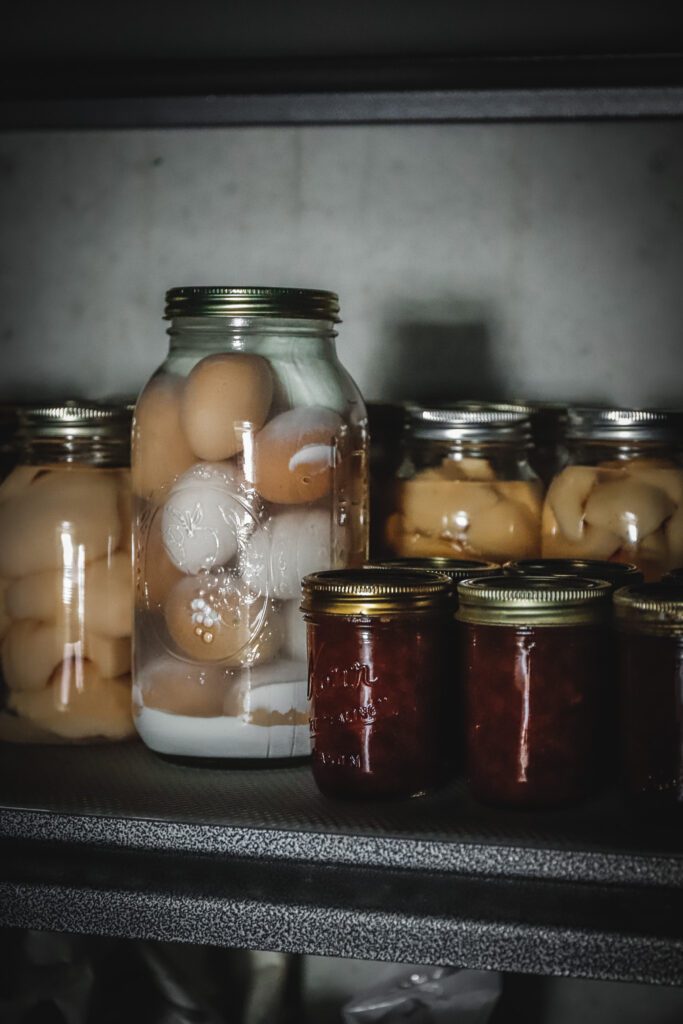
From what I read, eggs stored using this method are the most comparable to fresh eggs, which is encouraging. When it’s time to use an egg, just make sure to rinse it off. Also, I saw some things about NOT using them for boiled eggs, so I’m going to keep that in mind.
Other Methods:
From what I’ve heard, people have also had great success with freeze-drying and dehydrating fresh eggs. I’ve never tried either of those methods, but I’d love to give freeze-drying a shot. My folks just purchased a machine this fall so when the girls are laying again, next spring, I’m going to try it out.
If you have chickens and have an egg preservation method you’ve tried and really like? Please tell me in the comments! I’d love to know!
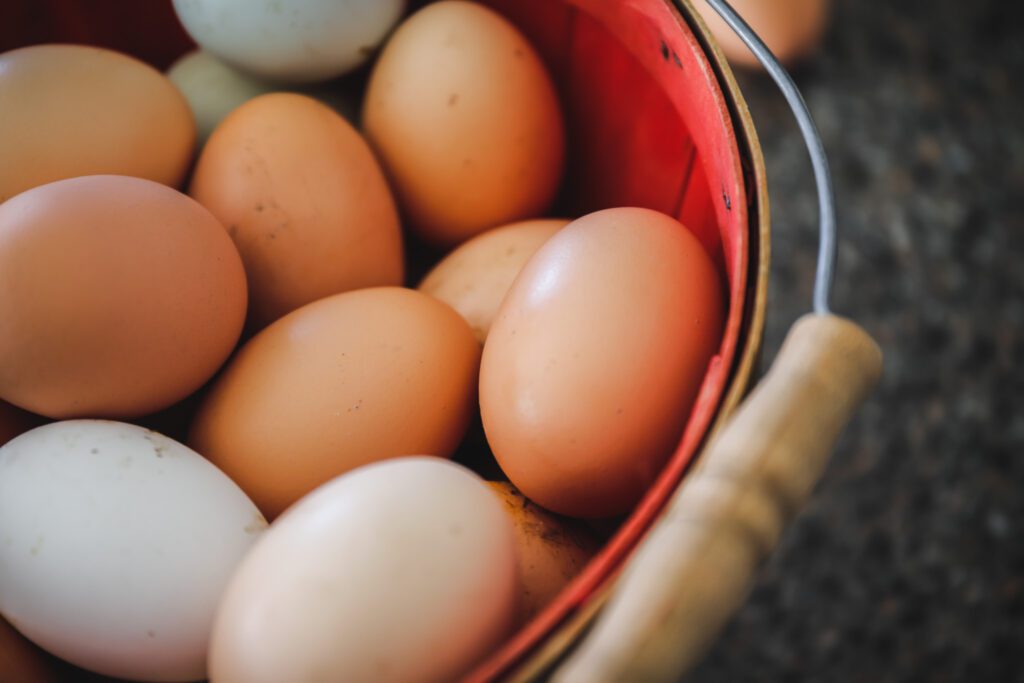
After trying these out this winter, I’ll report back and add a little update with my thoughts. But, who am I kidding? With everything going on, I’ll be lucky if I remember I’ve even got eggs in the basement.
So, uh… somebody please remind me, ok?